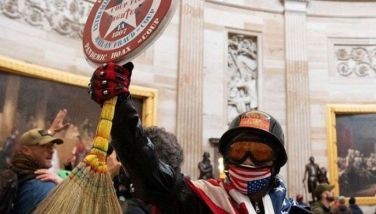Liberia urges UN not to reduce peacekeeping force
UNITED NATIONS — Liberia urged the United Nations on yesterday not to reduce its peacekeeping force in the country, warning that the Ebola epidemic is threatening peace and social cohesion.
Liberia's UN Ambassador Marjon Kamara told the Security Council that a strong international presence in the country is "a critical stabilizing factor in a situation where the social, political and economic environments are fluid and delicate."
After the Ebola outbreak, the council backed a recommendation by Secretary-General Ban Ki-moon to extend the mission until Dec. 31 and delay any cuts until then. The council in 2012 ordered the military force cut from 7,950 military personnel to 3,750 by July 2015.
Kamara appealed to the council to extend the mandate for a year and put off consideration of a reduction in the force, which had just over 4,500 military personnel at the end of September.
Ebola "has accentuated fragilities and vulnerabilities which have the potential to trigger violence, if not adequately addressed," Kamara said.
She said youth unemployment is rising and people are having difficulties earning a living because businesses have closed.
UN peacekeeping chief Herve Ladsous said the United Nations supports extending the mission's mandate until September 2015 and deferring a reduction of troops until health authorities report that the Ebola crisis is over. The secretary-general has also recommended that the UN mission play a greater political role.
Kamara said the government hopes conditions improve significantly in time for elections to replace 15 outgoing senators, which were announced for Dec. 16 by the legislature Tuesday.
Ladsous noted that many civil society representatives have raised concerns about the appropriateness of proceeding with the election while Ebola is still not under control.
"Political and social divisions in Liberia are deepening," Ladsous said. "However, there is some good news in the midst of this serious crisis. We are no longer seeing signs that security could seriously deteriorate, which was our fear in late August and early September."
- Latest
- Trending
































